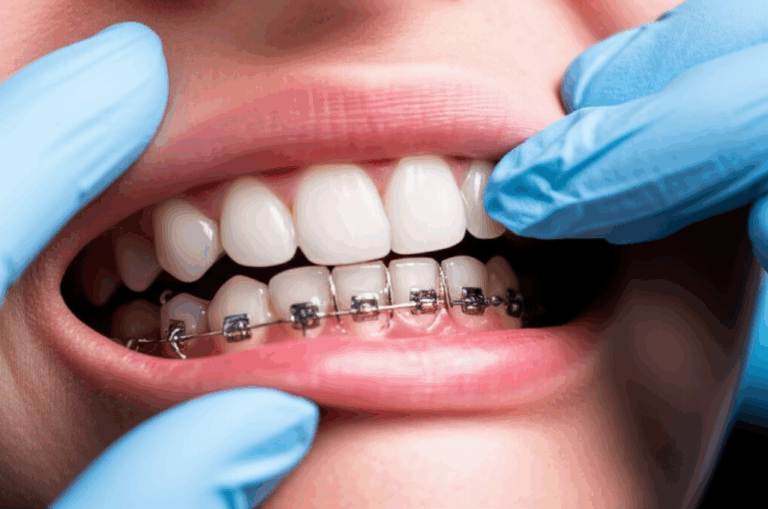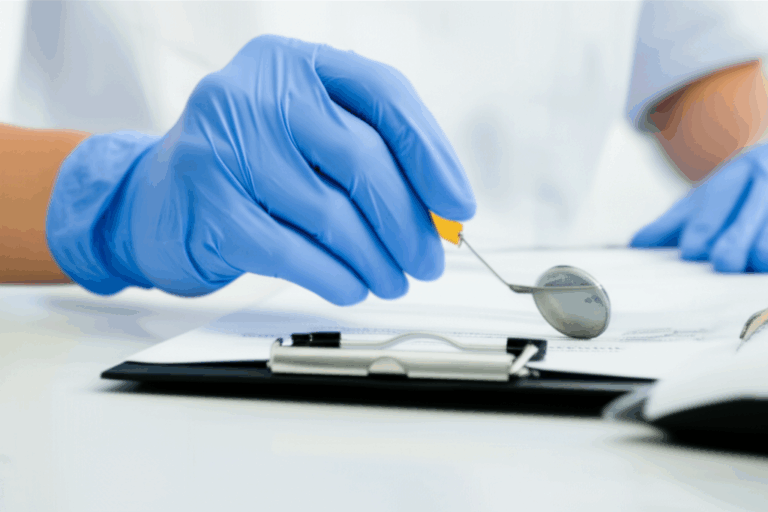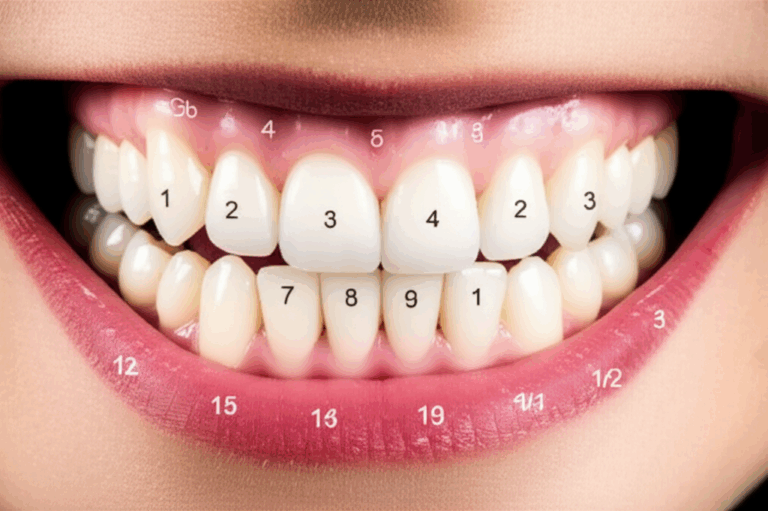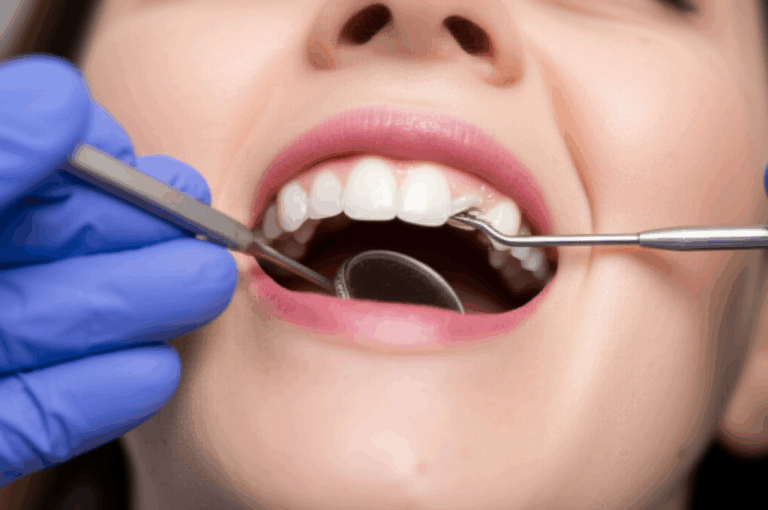
Can Your Dentist Diagnose Tonsillitis? Understanding Their Role in Identifying Throat Issues
Short Summary:
Ever wondered if your dentist can spot more than just cavities or gum problems? Maybe you go to the dentist with a sore throat and big tonsils. Can your dentist help? In this article, I’ll explain the real answer, tell you what tonsillitis is, and show why knowing the overlap between mouth and general health can protect you and your loved ones. Read on! What you find out here could make your next dental visit even more useful.
Table of Contents
What Is Tonsillitis? Symptoms and Causes
Let’s get down to the basics. Tonsillitis means the swelling of your tonsils. These are two round pads at the back of your throat called the palatine tonsils. When they get bigger, it can make your throat feel itchy or even hurt.
Main Symptoms of Tonsillitis:
- Sore throat
- Hard to swallow
- Red, big tonsils
- White or yellow spots on the tonsils
- Swollen lumps under the jaw or neck
- Fever
There can be other signs, like bad breath or your voice sounding different. In kids, tonsillitis can make their stomach hurt or make them throw up sometimes.
What causes tonsillitis?
Most times, it’s a virus, the same kind that gives you a cold. Sometimes, bacteria like strep throat bugs are the cause. This one needs a doctor to give you medicine so it doesn’t get worse.
Can a Dentist See Tonsillitis During a Check-Up?
You might be surprised, but yes, dentists often get a close look at your throat! Every dental check-up usually starts with a full oral and throat exam. The dentist asks you to say “Ahhh,” checks your tongue, the top of your mouth, your gums, your teeth, and your tonsils.
What can a dentist really see?
- Big or red tonsils
- White patches or stripes on the tonsils
- Redness at the back of the throat
- Swollen lumps (lymph nodes) in your neck
- Bad breath
But here’s the thing: Dentists can spot these signs because they’re trained to be careful watchers. They might say, “Your tonsils look kind of big—are you not feeling well?” or “I see some redness back there.” It’s up to a regular doctor to make the real diagnosis.
What Do Dentists Look For in an Oral Exam?
Every time I go for a dental check-up, my dentist does more than just look at my teeth. Here’s what usually happens:
Dentists also look for:
- Tooth pain or pus-filled spots that might make your throat hurt
- Gum sickness (gingivitis or periodontitis) that can look like swelling you see in tonsillitis
- Signs of a mouth fungus, another infection that sometimes looks like white spots
If my throat hurts, my dentist checks if the problem is coming from a tooth, gum, or somewhere else. That’s smart! Sometimes, even adults can’t tell where the pain is coming from.
Why Dentists Don’t Formally Diagnose Tonsillitis
Okay, so here’s the main point. Can a dentist diagnose tonsillitis? Not for sure. Let me tell you why.
What Dentists Do:
Dentists are trained to spot problems in the mouth, teeth, and gums, and the start of the throat. They are not the main people for treating sicknesses that affect the rest of your body.
Dentists Don’t Have Medical Tests:
Doctors can do throat swabs, quick strep tests, and order blood work. Dentists don’t have these tests for finding strep throat, mono, peritonsillar abscess, or other infections.
Why Guessing Is Not Good:
It can be bad to call a sore throat “just tonsillitis” without the right tests. Most dentists see the signs and send you to your regular doctor or an ENT specialist for a real check.
Table: What Dentists Can and Cannot Do About Tonsillitis
| What Dentists CAN Do | What Dentists CANNOT Do |
|---|---|
| Notice big, red tonsils | Do throat swabs |
| See white spots on tonsils | Give antibiotics for strep throat |
| Feel for swollen lumps in neck | Make a real medical diagnosis |
| Ask about your health history | Order blood tests |
| Send you to the right medical professional | Treat sicknesses for the whole body |
Dentists as the First Line of Defense
Now, let’s talk about the good side. Dentists help spot bigger health problems early.
For example, did you know that almost 15-20% of dental patients are sent to a doctor after their dentist sees something odd? Lots of people see their dentist more than their regular doctor!
A dentist is often the first health person to notice:
- A bad sore throat that won’t go away
- White patches or bleeding in the mouth
- Trouble swallowing
Catching things early matters. If you ignore signs of bacterial tonsillitis (like strep throat), it can cause real problems—like rheumatic fever, which hurts the heart.
So, even if your dentist can’t treat tonsillitis, he or she could save you from bigger issues by seeing symptoms early.
Dentist Referrals: How Do They Work?
What happens if my dentist thinks I might have tonsillitis, or something else that’s not a mouth problem? Here’s what usually happens:
It’s a good team effort. Dentists know what they can do and work with other healthcare workers. If you’re seeing a dentist in a modern place like a china dental lab, you might even get digital records that make sending you to the doctor fast and easy.
When Should You See Your Dentist or Doctor for Throat Pain?
Sometimes, it’s not clear who to call first—your dentist or your doctor.
- See your dentist: If you have throat pain AND tooth pain, big gums, or think you have a tooth with pus—or if you’re just at your regular dental check. Dentists can check for mouth causes and notice throat issues.
- See your doctor: If your main problem is sore throat, fever, big tonsils, hard time swallowing, or you feel sick all over. They’ll do the right tests and treat you.
Quick Tip:
If you hurt after dental work or from a new dental device, like a retainer or dentures, let your dental team know. Modern removable denture labs can help if your device is hurting your mouth.
Why Oral Health Professionals Matter in Early Detection
Did you know?
Dentists are more than “tooth doctors.” They see thousands of mouths a year and are often the gatekeepers for your full health.
Dentists look out for:
- Mouth cancer: By checking for strange lumps or changes
- Infections: Finding pus, abscesses, or mouth fungus
- Whole-body diseases: Like diabetes or immune system problems that can show in the mouth
And yes—even things like tonsillitis may be seen first by a dentist.
This wide knowledge helps dentists suggest when quick care is needed. Just another reason not to skip your six-month check-up!
Your Dental Visit: What to Expect If You Have Throat Pain
Going to my dentist with a sore throat makes me a little worried. Here’s what usually happens:
Getting this checked early can help you get care faster and stop things from getting worse.
For people who use dental devices, like bridges, crowns, or night guards, a good crown and bridge lab can work with your dentist to be sure no device is making your throat or mouth hurt.
FAQs: Common Questions About Dentists and Tonsillitis
Can my dentist give medicine for tonsillitis?
No, dentists usually can’t give antibiotics for tonsillitis, unless it’s from a tooth infection.
Can a dental hygienist see throat problems?
Yes, hygienists are trained to see signs like white spots, swelling, or redness, and will let the dentist know if they see something strange.
What if my dentist thinks I have strep throat?
They’ll tell you to see your doctor for a quick strep test and to get the right care.
Can mouth problems look like tonsillitis?
Sometimes—like a tooth with pus, or even mouth fungus. That’s why you need a doctor to say for sure.
What’s the risk of ignoring throat infections?
Things like strep throat can turn into bigger issues, like rheumatic fever or pus next to your tonsil, so don’t wait—get it checked!
Key Points to Remember
- Dentists can see signs of tonsillitis but don’t make the real diagnosis.
- Tell your dentist if you have a sore throat, big tonsils, or something weird going on.
- Your dentist is an important early checker for many health problems.
- For real answers and treatment, go to your regular doctor or a throat doctor.
- Never ignore a bad sore throat, especially if you also have fever or trouble swallowing.
- Dentists and doctors work together to keep your mouth and whole body healthy.
- Keep up with check-ups—they help more than you think!
- If you wear crowns, bridges, dentures or other mouth devices, find a digital dental lab that works with your dentist to keep things comfy and safe.
References:
- Centers for Disease Control and Prevention: “Sore Throat and Tonsillitis”
- American Dental Association: “Screening in the Dental Practice”
- Mayo Clinic: “Tonsillitis – Symptoms and Causes”
- Journal of Oral Pathology & Medicine: “Oral Problems of General Illnesses”
Stay healthy, and don’t be shy with your dentist—your mouth is the door to your health!








